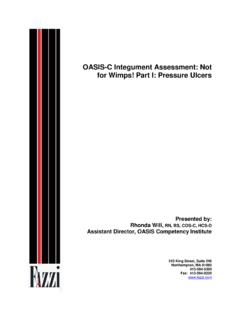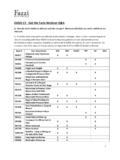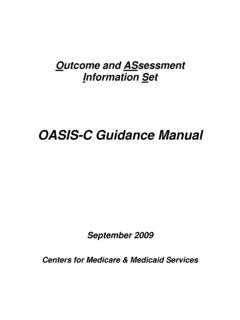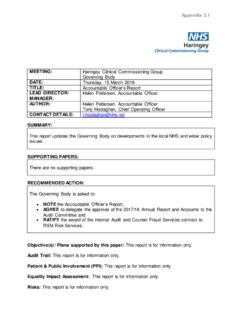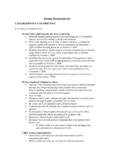Transcription of How to Hold Staff Accountable - Fazzi Associates
1 How to hold Staff Accountable Dr. Bob Fazzi The ability of a supervisor to hold their employees Accountable is the single, most important management skill a supervisor must have! This is a statement and reality that is so critical, it needs to be repeated: the ability of a supervisor to hold their employees Accountable is the single, most important management skill a supervisor must have! Think of all of the supervisory management skills expected of supervisors: Positive reinforcement! Goal setting! Delegation! Conflict management! Team building! Communication skills!
2 Active listening! Feedback! Leadership! Organizational skills! Motivation techniques. Skill development! The list goes on and on. The fact is that all of these techniques are geared to one thing getting employees to complete work in a timely and quality manner. Lots of techniques to simply get the work done! And when you look a little closer, you realize that the process is fairly simple and straightforward. The supervisor defines what needs to be done, delegates it to the employee and then monitors and ensures that it is done. The glue that makes this work is the overarching management skill every supervisor needs, the ability to hold Staff Accountable for the tasks that they need to do.
3 The best managers know that the true measure of success is to ensure that Staff complete task in a timely and quality manner. The Two Measures of Success Before a supervisor can hold Staff Accountable , they must understand that there are really two measures required for a task to be successfully completed. One measure is quality, the other timeliness. Quality: The completion of a task or responsibility in manner that meets all standards of excellence for that task or responsibility. Timeliness: Completing a task or responsibility on or before the stated deadline for that task or responsibility.
4 It is easy to see why both are essential to measuring success. Doing a great job but missing the deadline leads to failure, not success. The perfect grant application submitted two days after the deadline is useless. So too is the grant application submitted on time but poorly written. The key to ensuring success is found in the ability of the supervisor to hold Staff Accountable for both the quality of the job and the timeliness required to complete the task. The Three Steps for Holding Staff Accountable The vast majority of supervisors and managers know what needs to be done for an employee to successfully complete a task or responsibility.
5 Most supervisors are also very competent at delegating responsibilities to specific Staff . The problem is that many of these same supervisors assume that delegating the act of telling people what to do - is the measure of a good manager. It is not! Simply telling people what to do and even giving them timelines for when the task needs to be done is not enough. Success is measured by the employee the person that the task was delegated to completing the task in a quality and timely manner. Some task are recurring, done over and over again like visits to patients, completing an OASIS assessment, coding a client, completing bills, etc.
6 Others are one- shot deals like running a project or having a unique meeting with a new referral source. Either way, success is defined as completing the tasks or responsibilities in a timely and quality manner. The key to holding Staff Accountable can be found in the three step Supervisory Accountability Process. This process is one of the key components of the Functional Management Model, one of newer generation supervisory management models and a model taught extensively in home care. The accountability process follows three systematic rules: 1. The Expectation Rule: You cannot hold a Staff person Accountable unless they clearly understand all of expectations of the job or task being delegated.
7 Whether you are delegating the full responsibilities of a job, like everything expected of a clinician in the field, or you are delegating a unique responsibility, like outcomes that are expected from a meeting with a referral source, supervisors must be very clear on the two measures of success quality and timeliness. 2. The Skill Verification Rule: You cannot hold a Staff person Accountable for skills or knowledge that they were never trained or educated on. Once the supervisor is assured that the Staff person knows what is expected on the job (The Expectation Rule), the supervisor is responsible for ensuring that the Staff person is trained and has the knowledge and skills needed to be a success.
8 The employee is not considered skill- ready until the supervisor verifies that they have the knowledge and skills to complete job requirements in a timely and quality manner. 3. The Accountability Rule: Once the supervisor verifies that the employee knows what they are expected to do (The Expectation Rule) and they have the skills and knowledge to do the job in a timely and quality manner (The Skill Verification Rule), the supervisor can and must delegate the responsibilities and hold the Staff person Accountable . Holding Staff responsible means monitoring the Staff person s performance and making sure that the task and/or responsibilities are completed in a quality and timely manner.
9 Holding Staff Accountable means that the supervisor sets a time when they review each employee s task and responsibilities. How frequently a supervisor does this really depends on the functional level of the employee. Different Levels of Functioning Means Different Levels of Monitoring Some employees are superstars. They always come through. These employees do not need to be tightly monitored. They function at a very high level. For these employees, the supervisor needs only to monitor the employee infrequently or at the end of the project if it is a project.
10 Why continue to monitor and track the efforts of an employee who is high functioning and who consistently comes through? These employees need and deserve recognition and statements of appreciation but they don t need to be tightly monitored. On the other hand, there are employees who function at a lower level, are inconsistent and often lack the motivation and/or confidence to complete the task or responsibility in a timely and/or quality manner even though they have the knowledge and skills to do the job (remember Rule 2). These employees need to be supervised and monitored more tightly.

